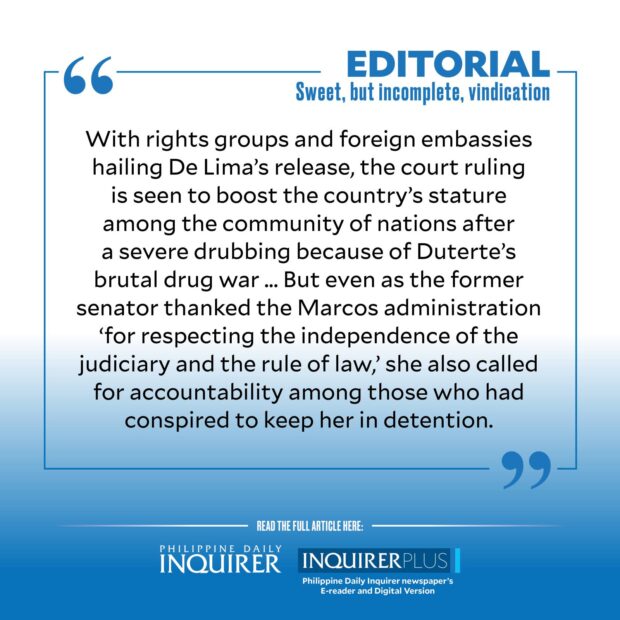
After being detained for almost seven years, former senator Leila de Lima on Monday described as “a moment of triumph and thanksgiving,” the court decision to grant her bail in the third and last drug case filed against her by the Duterte administration.
In his ruling, Judge Gener Gito of the Muntinlupa City Regional Trial Court Branch 206 said the testimonies by nine government witnesses were “not sufficient to establish conspiracy [in the alleged illegal drug trade inside the New Bilibid Prison] among the accused.” The ruling allowed De Lima and her coaccused former Bureau of Corrections (BuCor) chief Franklin Jesus Bucayu, her former aide Ronnie Dayan, and security aide Joenel Sanchez, and Jose Adrian “Jad” Dera to post bail of P300,000 each.
Still, with her third case pending, she acknowledged that it was a partial victory, and that she would “further work for complete vindication.”
The Duterte administration had accused De Lima of receiving payoffs from drug traffickers when she served as justice secretary between 2010 and 2015. The three drug-related cases have been widely viewed as political payback for the former human rights commissioner’s investigation of alleged extrajudicial killings by the so-called Davao Death Squad when Rodrigo Duterte was city mayor in 2009. After key government witnesses last year recanted their earlier statements against De Lima, citing government threats and coercion, the courts tossed out two of the three drug charges.
With rights groups and foreign embassies hailing De Lima’s release, the court ruling is seen to boost the country’s stature among the community of nations after a severe drubbing because of Duterte’s brutal drug war. Said De Lima ally former senator Antonio Trillanes IV: “The whole world will now know how Duterte misused and abused power to persecute those who dared stand up to his murderous regime,” via X (formerly Twitter).
Butch Alano of Amnesty International’s Philippines section said the ruling was a step toward justice for the “prisoner of conscience.” The Human Rights Watch meanwhile said De Lima’s detention had “inspired a generation of human rights defenders in the Philippines and beyond.”
De Lima’s case highlights the similar plight of other innocent Filipinos who are falsely accused, Sen. Risa Hontiveros said. “We must work harder to ensure that all incarcerated persons are able to avail of speedy remedies under our justice system,” she added.
The ruling should prompt changes in the country’s tedious court process, said Sen. Grace Poe. “Rich or poor, it is not fair for someone to stay in jail for a long time because of the slow legal process in the country,” she said. De Lima herself had bewailed the loopholes in the system, saying that her legal team had to struggle to prove her innocence as it went through arduous court procedures.
But even as the former senator thanked the Marcos administration “for respecting the independence of the judiciary and the rule of law,” she also called for accountability among those who had conspired to keep her in detention.
It should be asked, said former senate president Franklin Drilon, who will answer for the sufferings of De Lima due to unwarranted charges? “Someone should be held accountable for this,” he said. Drilon noted that former BuCor chief Rafael Ragos had implicated former justice secretary Vitaliano Aguirre and several others for coercing him to sign “pre-written affidavits against De Lima.” Such act, Drilon said, “is punishable under the Revised Penal Code, specifically subordination for perjury. When you force a witness to lie in order to indict someone.”
It is indeed part of restoring law and order that officials, in high positions at that, should be held to account for prostituting and subverting our judicial system for political vendetta. The De Lima saga—from the slut-shaming she received at the supposedly honorable legislative chamber of the House to the rounding up of convicted felons to cough up scripted accusations against her, and being rewarded for it later, to the secretary of justice orchestrating the drug charges—showed how government powers can be used to satisfy a vengeful president.
Now the pressure is on President Marcos’ administration to end what many consider as De Lima’s politically motivated ordeal. With his fragile alliance with the Dutertes at stake, the President has so far resisted calls for him to use his executive powers to release the former senator, saying he did not want to interfere with the court process. Mr. Marcos has also barred the International Criminal Court from entering the country and investigating the former president for the thousands of drug-related killings during his term.
De Lima is apparently counting on this pressure, and rightly so. “When the Marcos administration came, there was hope, at least in my case, that justice will happen.”
With the whole world watching, it is an imperative that the President cannot ignore.